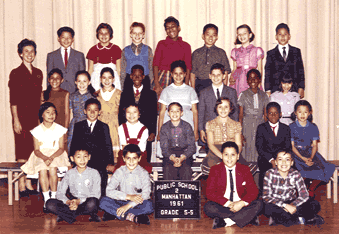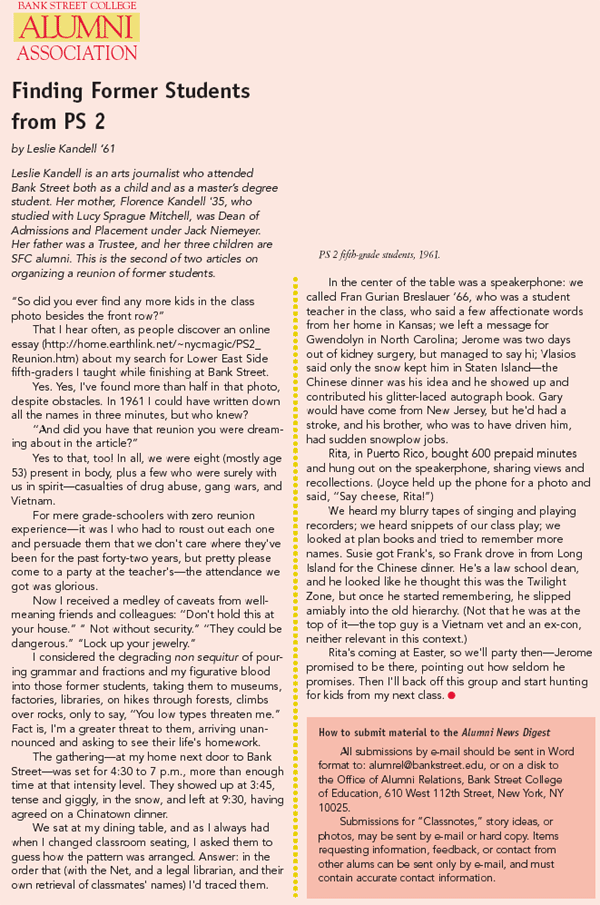
Home
Can I Come?
Calendar
Photos
Links & Classifieds
Be Nice Campaign
Passwords
Past Invites
Press
Contact
Here
are some P.S. 2 people, born 1951, that we're still looking for. (Married
names are not known.) Please join our search.
The following article appeared in The New York Times August 3, 2003: A Reluctant Reunion ADDING what I've heard to what I'm sure of, I can now account for the whole front row of my class photo, and a couple of children in the middle and rear. By ''my class,'' I mean one of the fifth grades in Public School 2 on the Lower East Side, where I taught when John F. Kennedy was president. I found that old photo after a friend transferred to a CD the decaying reel-to-reel tapes I had made when I lugged my newfangled recorder into the classroom just for fun. The CD, rising from the tapes' ashes, revealed a young teacher talking and singing with students and rehearsing ''Lonesome Train,'' the folk oratorio that was our class play. Getting the children together again, to hear the CD and share memories, sounded like a great idea. With naive enthusiasm, I set out to round them up. After a series of dead ends, I'm thinking it's easier to find a witness in a protection program. New York City schools don't track their graduates, although Caroline Kennedy, in her new role as fund-raiser for the city's Department of Education, says she hopes to form an alumni association of some kind. But for now, the one doing the homework is me. Class records from before the computer era are unavailable. Colleagues are retired. Everyone I knew in the administration is dead. I don't find my kids on Classmates.com or through directory assistance. Private detectives want the moon -- Social Security numbers and girls' married names. I wish my former students could reconnect -- with being 10, with what they once learned, with forgotten friends. During my search, someone suggests that I'm the one looking to recapture my youth. It's true: as I grow older, I become a nostalgia-seeker, a retriever of memories. Shared history makes time fall away. The bond forged by knowing someone early in life should endure. Perhaps I'm the one learning the lessons. ONCE, long before P.S. 2 was built, the Lower East Side teemed with immigrants who arrived with nothing, sometimes not even their own names. Their children, among them the Irving Berlins, the Danny Kayes, the Al Jolsons, took advantage of free education and worked their way out of poverty, pointing with pride to the picturesque pushcarts and tenements of their beginnings. But by the late 60's, the streets had an aura of incipient danger -- ''West Side Story'' with less charm and more drugs. It wasn't a neighborhood where boys fled the Vietnam draft by going to college or Canada. They left high school and went into the service. Not all came back. I study the smiling boys in the class photo sitting cross-legged down front. (Notices were sent home, and the children who weren't going to doll up just didn't come that day.) Left to right: Chinese, Italian, Hispanic, Greek. In other rows more of each, and blacks, Poles, a Hawaiian -- the original Rainbow Coalition. But n my day at P.S. 2, teachers were busy scooping batches of students into the next grade and forgetting them, as they forgot us. Eddie (front row, far left) joined a gang and Mike (far right) thinks Eddie is long dead (I certainly can't find him). A few are listed on the Vietnam Veterans Memorial, and I find two other death certificate matches. (Someone thinks Gary P. is dead, too, but about 35 years ago he looked me up and visited along with his fiancee. He wanted me to know that after reform school and prison, he had a job paving sidewalks and was taking night courses in algebra so he could be a construction manager. So I believe he's out there somewhere.) Andrew (front row, red jacket) now lives in Minnesota. He had won a merit scholarship to Brown University from Seward Park, where most P.S. 2 graduates go but only 28 percent of entering freshmen graduate. (At Stuyvesant, within walking distance, it's 93 percent.) The number of Seward Park applicants admitted to Brown in the last decade is zero. I call Andrew. ''Maybe the best thing you did was show us what's out there,'' he tells me. When Mike hears my name on the phone, he growls, ''Get out of here'' with inflections right out of ''The Sopranos.'' He startles me back when I ask, ''How old are you now, Mikey?'' I am ready to hear 30, but he's 52. (Surely that's older than I am, isn't it?) When I say I remember him as a perfect child, he shouts to his family, ''Hey, the teacher says I was a perfect child!'' When I find Effie, now an artist, she has a very old bone to pick: ''Do you remember when you took us on a trip to the Cloisters?'' Sort of. ''And you lost your watch?'' Oops. ''Well, you made us all look for it.'' I regret spoiling her trip. I remember that the watch had been a gift from my father. I speak of my worry over the loss, and my fear of disappointing him. Mollified by an unexpected apology, she speaks of her own father's savage temper. She goes on to recall being the narrator in the class play, and mentions my interest in the cello, the first time she noticed that a teacher could have a life beyond school. She has never had a reunion experience, and is suspicious at first. We finally meet. She listens to the tape, and we talk and talk. ''You're not going to make me leave now, are you?'' she says after the afternoon is gone. No I'm not. We figure out a few more names on the photo. Later, she makes a date to meet with Mikey. I ask Mike if he will get hold of classmates so we can get together. ''No,'' he says, ''I wanna meet witcha alone.'' I would have put on a pleasant expression on the way up the subway steps, but Mike is too quick not to guess that, and evidently wishes to see my face when I recognize him. He is down on the platform watching for me. We are both dazed. We sit in a downtown Greek diner, where he knows the owner, for three and a half hours, during which time we have one cup of coffee that we don't want. I remember Mike as someone I could rely on to get a job done, a stable child. ''Nam'' was devastating for him. What he saw there, and did, left him with post-traumatic stress disorder, documented in a government file as ''permanently unemployable'' because of ''episodes of unprovoked violence.'' So he goes to the
V.A. hospital and lives on disability he would give up in a heartbeat This isn't turning out like any reunion I have ever gone to. It will be a long time before my fifth graders sit in the same room eating cookies, or whatever I was imagining, and listening to that tape. What I've found is less complete but no less compelling. I persuade Mike to read his journal to his veterans' group. ''It's hard, but not impossible,'' he tells me after he has tried it. ''Just when I thought there was no more road, another half-mile showed up.'' And as my search continues, connecting with each of them is like a half-mile showing up for me. Leslie Kandell, a
journalist specializing in the arts, is working on a book about church
choirs. From the Bank Street Newsletter - http://www.bankstreet.edu/gems/about/stsfall04.pdf
|

